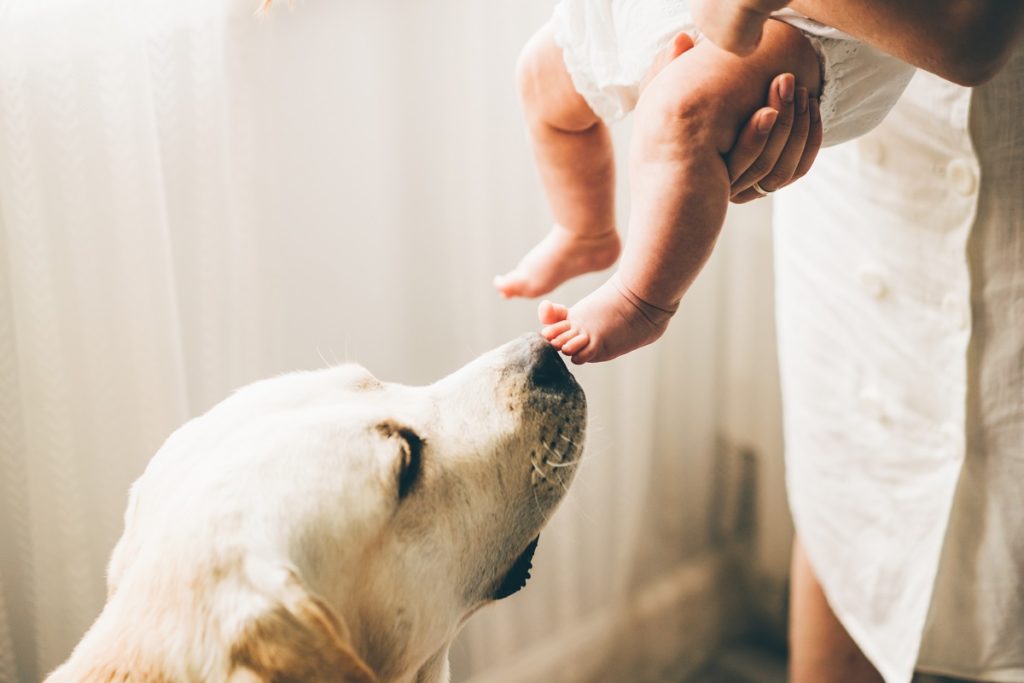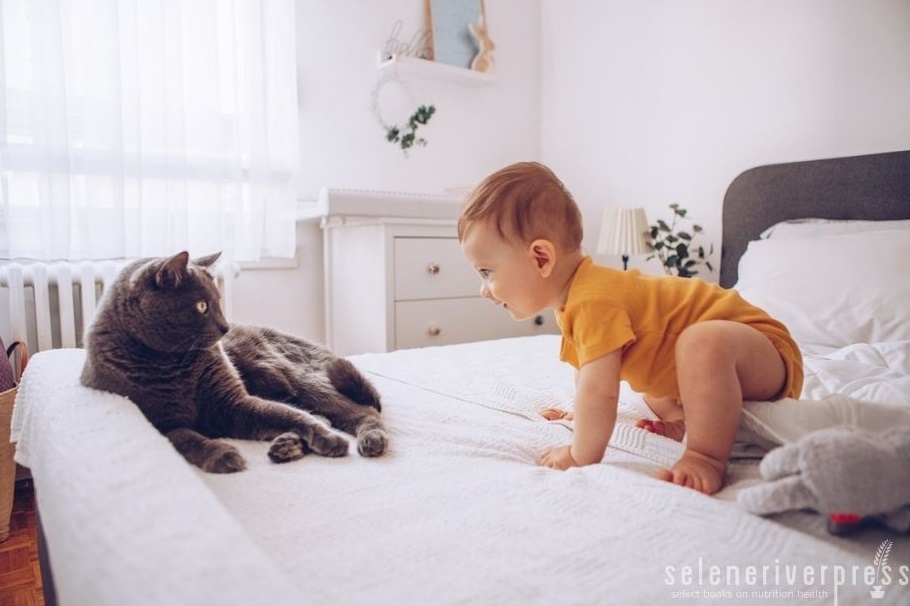Starting a new family is one of the most amazing and exciting experiences of a lifetime. But if you’re already a pet parent, there are a few things you can do to prepare both you and your four-legged “baby” for this new transition. Keep in mind that though this is a thrilling time for you, it can be quite a different experience for your pet.
Here’s a fun fact: experts say that dogs and cats can sense when a woman is pregnant—partly because pregnant women experience profound changes in their hormonal levels as they begin producing more progesterone, estrogen, and human chorionic gonadotropin (hCG), all of which affect their personal scent. Dogs and cats, thanks their keen sense of smell, can detect these changes even before a pregnancy test is taken. And later in pregnancy, they can even sense changes in a woman’s movements and emotions.
Whether you’ve decided on a home birth or hospital delivery, your pet will be in for some serious changes to their schedule and environment. Some families love the idea of their pet sharing in the sense of excitement and anticipation—not to mention the new smells of the baby. However, if you are considering a home birth, find out ahead of time if your midwife is allergic to dogs. Also, if your dog is stinky or annoying, or if they have a history of being aggressive to guests, make sure to keep them away from the birth by putting them in another room or a crate.
When the time comes, your pet may find all of the new sights, sounds, and smells a bit overwhelming. This can be upsetting at first, especially for cats and dogs that didn’t spend any time with children as puppies or kittens. To add to that, your own days to come with your new bundle of joy will unquestionably alter your daily routine, meaning that your pet’s schedule will change as well. For a dog who has been at your side most of the time and used to a daily routine, this adjustment can be difficult.
Cats are generally more independent than dogs and most don’t have a daily routine, so a new baby won’t affect them as much. Granted, you’re likely to have lots of company from family and friends to meet your new baby. Some sociable cats may enjoy the extra attention, while others may find it overwhelming. Spacing out visiting times can be helpful for your pet—as well as mom, dad, and the new baby.
Now let’s talk about a few other things you can do to make this transition easier.
Pets can find the new sounds from the baby alarming and distressing. Research is increasingly showing what dog owners have known forever: our pets feel our emotions and empathize with our pain. Researchers at the University of New Zealand exposed 75 dogs and 74 people to ten minutes each of a baby babbling, a baby crying, and radio static, then followed up by checking the participants’ cortisol levels for indicators of stress. The baby babbling and the radio static didn’t have much effect on the humans or the dogs, but the crying baby caused a dramatic rise in cortisol levels in both species. The authors of the study described this reaction as low-level empathy.
You may be able to desensitize your pet by playing baby noises in the weeks leading up to the baby’s arrival. For example, recordings such as Calm Pet: Desensitizing, Sounds for Animals are available free on YouTube. (In my opinion, all upcoming new parents should listen to these noises before the baby comes as well! LOL.)
Toys are another thing to keep in mind. It can be tough for dogs to tell the difference between their toys and baby toys. They can look a lot alike so it’s easy to confuse the two. A baby’s smell can also make their toys especially interesting to your dog. The simplest thing to do is keep baby’s toys off the ground and away from the dog, which is easier said than done. Start setting boundaries early and think about obedience training. “Drop it” is an essential command to teach your dog.
Earlier, I talked about how our pets have a keen sense of smell. This is the main sense they use to identify humans. (FYI, dogs can even sniff out the differences between identical twins.) If you’re planning a hospital delivery, it’s essential to introduce the scent of the new baby to your pet before you come home. This lets them know that this new human is a positive addition to the family. I suggest having a friend or family member bring home a blanket that your baby was wrapped up in at the hospital. Let them sniff the blanket while offering praise and a delicious treat. Repeat this a number of times until baby comes home.
When you arrive home, first greet your pet alone so they don’t get excited and jump on the baby or mom. Give them time to adjust to the new smells and sounds of the baby for a few days before introducing them to each other. After that, allow your dog to sniff the baby while controlled on a leash. Believe it or not, it can take dogs up to three months to become accustomed and comfortable with the newest family member. You can use these same techniques in the case of a home birth.
It’s best for everyone to create a new normal before the baby comes. You’ll obviously have less time to play with your pet after the birth, so why not get them used to the idea early? Consider eliminating a walk or cutting down on the duration of the walk. Bring your new baby stroller on outings when you walk the dog, and vary the time of day that you feed your pet. Start scheduling short play and cuddle sessions with your dog, and gradually give them less and less attention at other times of day. You can also use baby lotion on your own skin, set boundaries on where the pet is allowed, and so on. Anything you can do to break up their normal routine and set the rules before the baby comes can make it easier for your pet in the long run. “Exercise and general daily schedules should be preadjusted before baby comes home,” says Ilana Reisner, assistant professor of behavioral medicine at the University of Pennsylvania School of Veterinary Medicine in Philadelphia.
Some of these things may seem hard to do as you navigate the pregnancy, so don’t forget to enlist the help of your family. After all, it isn’t always easy when you’re dealing with nausea and less energy. But it’s not going to get any easier after the baby’s arrival. Don’t make the mistake of waiting, which will only lead to frustration. In the worst possible scenario, it may even lead to rehoming your dog or cat because you can’t handle them and your new baby at the same time. It’s all about prep time, baby!
Images from iStock/petrunjela(main), Maria Korneeva (post).


